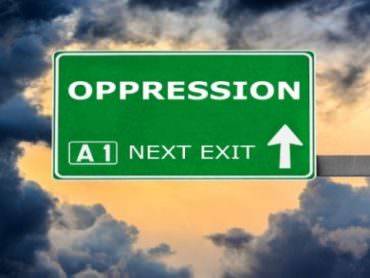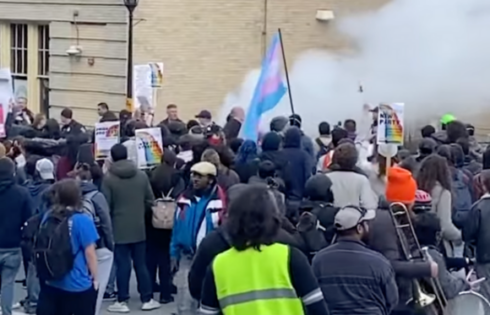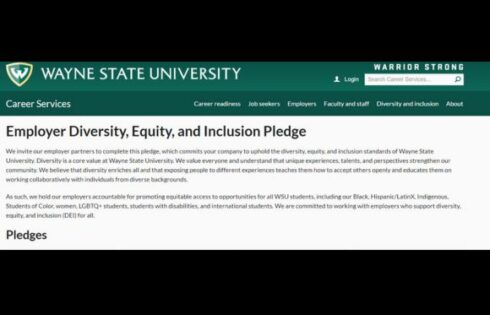
If you want to read a confirmation of every right-of-center parent’s fears about modern education, look no further than Gina Caneva’s article in the Huffington Post from Thursday.
In her “The Need for Social Justice Curriculum in White Classrooms,” the 14-year Chicago Public Schools teacher contends that white students aren’t acquiring sufficient knowledge of America’s “oppressed.”
Canevas wonders if such might have been the case with James Fields Jr., the man who rammed a car into a crowd of people in Charlottesville, Virginia, killing one. Fields’ former history teacher, Derek Weimer, noted “And there are others like him out there […] This isn’t something that happens overnight. It builds up over time and we need to pay more attention to this.”
Caneva adds:
The Charlottesville incident should embolden educators of white youths to incorporate social justice into their curricula. As a veteran teacher in Chicago Public Schools, I have taught mainly African-American and Latino students. My students are natives of social justice education; they are critical of systems of oppression, and they’ve memorized narratives of the oppressed ahead of Civil War generals. In fact, one would be hard-pressed to find a CPS teacher who doesn’t also consider herself or himself a teacher of social justice.
“But I wonder about educators and students in predominantly white schools,” she continues. “Are they learning and reading narratives of the oppressed?”
Caneva says she can only recall one instance of such in her own schooling, in 5th grade, and that “it wouldn’t be until [she] attended a diverse, public university where [she] took a long, hard look at our history.”
“I had no idea about the Cold War, Reaganomics, or the war in Bosnia,” she writes, “let alone racism, homelessness, and public school inequity, all topics I would delve into as a college student in Chicago.”
A rather, er, balanced, list of subjects, there. One wonders who bore the brunt of the blame for the Cold War among her professors.
MORE: Educators waste no time pushing social justice lessons in wake of Charlottesville violence
All of which ties into the following:
[…] when given lessons about social justice white, affluent students “expressed a genuine concern about inequalities, but connected the problems to individual shortcomings rather than systemic disadvantages.” The white students gained knowledge of the inequalities, but they couldn’t link it to the same systems that gave them privilege.
Check it: There is no such thing as a balanced approach when you’re a “social justice” educator. Caneva’s college courses tied in the Cold War, Reaganomics, and racism to that “long, hard look at our history,” but apparently didn’t see fit to discuss subjects like the shortcomings of the Great Society, how welfare policy helps tear asunder the black family, and how identity politics fractures American culture at large.
Not to mention, where were the conversations of why cities like Chicago, perpetually ruled by Democrats, suffer from a plethora of economic and social ills?
Social justice teachers are akin to progressive scholars in the post-Moynihan Report era: “[I]n an effort to protect their work from the charge of racism or ‘blaming the victim,’ [they] tended to avoid describing any behavior that could be construed as unflattering or stigmatizing to racial minorities.”
These educators frequently tout the necessity of “real conversations” about race and oppression, but they don’t really mean it. They want to give lectures … and you’d better listen. Students’ opinions that certain inequalities are a result of “individual shortcomings rather than systemic disadvantages” must be corrected.
Worse, some of these lectures serve to gravely hinder minority students when it comes to dealing with the real world. How does calling being on time and having a good work ethic “white supremacy” assist black and brown children with future employment … their very economic life blood?
Consider, too, that belief in a “color-blind” philosophy when it comes to race, once seen as the pinnacle of progressive thinking, is now the embodiment of racism itself because it does not take into account people’s “systemic disadvantages.”
And therein lies the contradiction: Progressives’ insistence on viewing everything — and everybody — in terms of racial identity means that some of the majority population will commit the culturally grievous error of … doing just that.
And the cycle continues.
MORE: Social justice has a ‘liberal bias,’ diversity official tells colleagues
MORE: Parents revolt after high school forces students to attend all-day social justice seminar
Like The College Fix on Facebook / Follow us on Twitter
IMAGE: Shutterstock







Please join the conversation about our stories on Facebook, Twitter, Instagram, Reddit, MeWe, Rumble, Gab, Minds and Gettr.